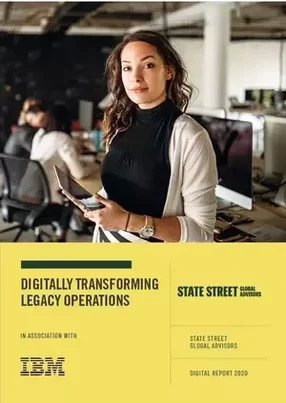Throughout his 25 year career, Jetinder Lali has been in the asset management industry, working for some of the largest asset managers in the world, including JP Morgan, BlackRock and UBS. “After becoming somewhat of a veteran within the industry I joined State Street Global Advisors as the Chief Digital Officer.”
Lali describes State Street Global Advisors as the third largest asset manager in the world and a part of the world’s largest custodian. In 1993 State Street Global Advisors invented the world’s first exchange-traded fund (ETF), which has since grown to US$6trn organically. “We are innovators, we are leaders and we are collaborators.”
Currently in the world of asset management, Lali has seen a shift within the sector to taking technology much more seriously. “it has become standard practice that digitalisation is either at the top, or is one of the top priorities of large asset firms. This is a direct result of our customers seeking more digital ways to engage with businesses. Data is also critically important and a challenge for the industry.”
Since joining the company three years ago, Lali has led the company through its digital transformation program to unify its customer experience for the first time. “Due to the size of State Street Global Advisors, we have lots of different divisions and brands. As part of our transformation we have unified our divisions representing ourselves to our customers as one global firm, which took us 18 months to achieve. Now we are working on improving our back end systems by updating roughly 12 years of legacy systems and redundant websites.”
As Lali explains State Street Global Advisors’ digital transformation strategy, he breaks it down into three simple words: “Simplify, unify and amplify. In order to achieve this it is important for us to build the right foundations and decide what our architectural roadmap will look like in order to get us to where we want to be in the future. Over the last 18 months we have certainly taken care of unifying our web experience, data platforms and analytic systems, providing our customers with a 360 degree view. We are also making great progress in this area across our sales, marketing and digital touch points. Our next steps are to look at our legacy systems and understand which systems we need for our operations and which we need to build out.”
To further its digitalisation journey, State Street Global Advisors is currently harnessing artificial intelligence (AI), advanced analytics, automation and cloud. “Within our broader corporation we have a data science team where we are currently working on a joint advanced analytics project,” says Lali. “We are also working with several automation solutions at both a deep infrastructure level as well as at the user level. Additionally, we are using automation technology to automate workflows, as well as harnessing cloud technology to streamline our operations allowing us to move faster within the industry.”
When it comes to data management, Lali says the company relies “ heavily on having a core data infrastructure to provide our services as custodians of over 10% of the world's assets. So cybersecurity is incredibly important to us. We have a very robust infrastructure in place and a dedicated team to manage any threats. We are also continuously looking at technology from new providers such as Adobe, where we are starting to look at their cybersecurity services. In addition to Adobe we currently use Akamai across the organisation.”
With digital transformation comes a lot of disruption for any organisation, Lali highlights that, at State Street Global Advisors, the company splits its change management strategy into three key areas: people, process and technology. “Across our organisation we defined our operations and our digital strategy very early on with a four year road map in mind. We defined what capabilities we wanted to retain and where we had gaps, as well as the solutions to fill the gaps and potential partners such as IBM who were very helpful in the simplification and rebuild of our web stack. When it comes to the processes, over the years they have organically grown across our regions resulting in inconsistencies. So, like our technology, we looked to standardise our governance around data, processes and how we build solutions. Finally, in terms of people, we have several hundred working across the digital aspect of the organisation, but a lot of the technology we decided to use was new. As a result we spent a lot of time training our people across the world. Last year alone we did 4,000 hours of training as part of our partnership with Adobe, which we are looking to exceed this year.”
Lali also highlights the importance of maintaining communication as part of a change management strategy. “Everybody wants change, but everyone hates having to change. Therefore, we spend a lot of time communicating and training people on the technology we are using to give people a better understanding of what is possible.”
Reflecting on State Street Global Advisors, Lali believes that the company’s biggest strengths are its ability to provide great partnerships for its customers, not just for its products but for its relationships it has across the industry, as well as its collaborative and innovative mindset, to drive the industry forward. “We’ve had many successes over the years, I would say that our biggest successes are our years of operation - over 120 years - as well as being the third largest asset manager in the world, inventing the first US listed ETF, building the first front-to-back platform for the industry and our leadership within environmental and social governance (ESG).”


